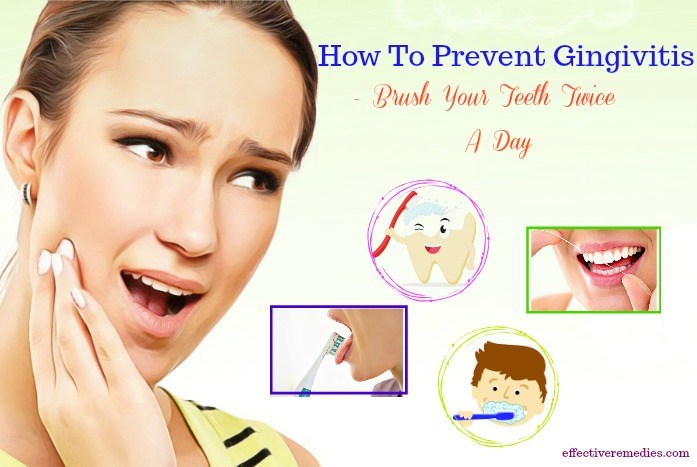Updated: 07/21/2019
Contents
Nowadays, gingivitis[1] is a common problem that many people face up. Although that disease is not quite serious, it will not only make people feel uncomfortable but also make stumps lose its protection. If people do not find out or treat it early, it will lead to many other severe symptoms. However, you needn't worry; in this writing, we will introduce you to some of the main prevention to avoid gingivitis without any side effects. Let's read this article of top 12 useful ways on how to prevent gingivitis from getting worse naturally on Effective Remedies to have the best awareness about overcoming gingivitis.
- Best natural home remedies for gingivitis in toddlers & adults
- Home remedies for toothache pain relief
12 Best Ways On How To Prevent Gingivitis From Getting Worse Naturally
I. Symptoms Of Gingivitis
These are some common symptoms of gingivitis that many people face up to:
- Swollen gums
- Bright red or purple gums
- Gums that are tender or painful to the touch
- Bleeding gums or bleeding after brushing and/or flossing
- Bad breath (halitosis)
II. Causes Of Gingivitis
Many causes can lead to gingivitis, but these are the most obvious:
- Poor oral hygiene: That will make the bacteria assemble in the mouth and gradually turn into gingivitis.
- An improper diet: Eating a lot of fast food, drinking alcohol, soft drink, or using too much stimulant is also another factor.
- Changes in hormone in our body, especially in pregnant women: That reduces the resistance of the gingiva to the bacteria on the surface of our teeth.
III. How To Prevent Gingivitis From Getting Worse Naturally
1. Brush Your Teeth Twice A Day
Many dentists suggest that you should brush your teeth at least twice a day[2] [3]. You can brush more but twice a day is ideal. By this way, you can remove the bacteria and have better breath. It also has a massage action on the gums which improves the circulation of gums. You should follow these simple steps when brushing your teeth:
EffectiveRemedies Partner Solutions

Ask a Doctor Online and Get Answers in Minutes, Anytime!
Have medical questions? Keep asking questions to a Verified Expert until you get the answer you need.
- Put the toothbrush at a 45-degree angle at the edge of the gum. Start from the gum to the occlusal rim.
- Clean the inner of your teeth with these similar steps above.
- Clean the inner of your teeth.
- To have better breath, don’t forget to clean your tongue too.
2. Floss Daily
Besides brushing our teeth twice a day, you can also floss daily to protect against gingivitis. People of all ages can do it, no matter how old you are. Floss helps to clean areas where a toothbrush can’t reach. Flossing daily not only prevents cavities but also periodontal diseases[4] [5] [6]. To receive the best result, concentrate on the following proper techniques:
- Use dental floss with the length about 18 inches, wrap most of that floss around every middle finger. The other length of the floss will be used for other work.
- Keep the floss tightly between your thumbs and index fingers, slide it smoothly with repeating up and down steps between two teeth.
- Curve the floss smoothly around the base of each tooth. You also have to clean the gum. Don’t snap or force the floss because the gum tissue can be cut or bruised easily.
- When moving the floss from tooth to tooth, remember to use the clean sections of your floss. Avoid using the old one.
- To stop using the floss, use the same back-and-forth motion to bring the floss up and away from the teeth.
3. Choose Appropriate Toothpaste
Firstly, you should consider how good your teeth are to choose the best product. If your teeth are sensitive, you should buy the one which also helps you combat this problem. Remember that different age needs a different kind. Children prefer to swallow toothpaste, which does not contain sodium lauryl sulfate, whereas the one for the adult is harsher. Then choose the favorite flavor because that will encourage you to brush more often. Therefore, we will have the best teeth, avoiding gingivitis[7] [8].
4. Drink Enough Water
Water is also the key to avoiding gingivitis. Drinking lots of water can wash the food away after you ate. It will also keep your mouth in the moist condition. Moreover, the more bacteria-fighting saliva is produced and in the end, it will reduce your chances of gingivitis. A study shows that drinking hydrogen-rich water enhances the effects of the treatment for non-surgical periodontitis[9]. So how much water should people drink per day? Studies show that each kilogram is equivalent to 40 ml. For instance, if your weight is 50 kg, you should drink 2 liters of water per day. And there are four special times you should supply water to your body.
- After waking up: Drinking water before breakfast 30 minutes is the best because when you wake up after a long night, you need to offset the water. Drinking a glass of water before breakfast also helps to clean the intestines, avoid feeling hungry, and have better breakfast.
- After working hard: Adding water after exercise, walking, playing sports, or doing more work can help reduce stress and fatigue.
- 30 minutes before going to bed: Before going to bed half an hour, drinking a glass of water will help you to have sound sleep. This habit also protects against the risk of blood clot formation.
5. Vitamin C
Vitamin C plays a vital role in protecting our gingiva[10]. Being lack of vitamin C can easily make your gingival ulceration[11], bleed, or maybe lose your teeth. Therefore, you can supply vitamin C in our daily life as soon as possible in many ways. The ideal vitamin C content per day is about 0,1 mg. However, you should not overuse that, about 500 mg/day because it can have some side-effects such as headache, nausea, etc. Vitamin C will be “good medicine” if you take an appropriate amount of it. You can find vitamin C simply in almost vegetables and fruit, especially in the grapefruit, broccoli, red bell pepper, etc.
6. Do Not Use Toothpick Often
Many people like using toothpick or other same items to pick after eating and remove plaque[12] [13]. That hobby is not bad, but if you use it frequently or use the wrong side of the toothpick, there will be more gaps between two teeth and food can be stuck between that, which makes the bacteria nourish and your gingiva can be inflamed. Instead of that, you should use dental floss to clean your teeth.
7. Do Not Drink Too Much Soft Drink
There is the fact that a few people know when you use a soft drink, the liquid will go down your throat, but there is still a small amount of sugar film remaining on your teeth. This amount of sugar film can gradually lead to a gum infection, which is known as gingivitis. Moreover, some soft drink containing phosphonic, citric, and a large amount of sugar will make your teeth less white, lack of calcium. In some serious situations, you can lose your teeth. According to a study, drinking carbonated beverages is positively related to the risk of periodontal/gum diseases in Korean adults[14]. To meet this need, you can gargle with water, salt water or some liquid containing flora after drinking soft drinks.
8. Go To See The Dentist
Don’t wait until you have troubles with your gingiva to see the dentist. Doctors recommend that people with oral health should attend once every 12-24 months. More importantly, gum disease is usually painless; you may not know you have it. By checking regularly, the doctors can find your disease soon and you will have suitable care, medication, and diet from the dentists. They also clean our tartar on our teeth and gives people more knowledge to protect against gingivitis. The more hesitation you have, the more severe your disease will get. So go right now as soon as possible!
IV. What To Do If You Have Gingivitis
If you are doubtful that you have gingivitis, you should make a plan to get a dental appointment right away. But in case you are too busy with your work or family, you should try some home remedies here to help you overcome this problem.
1. Honey
- Manuka honey contains antimicrobial properties that help to kill oral bacteria and the gram-negative anaerobes related to gingivitis[15]. A study shows that topically applying honey may modify the pH level, reduce a significant number of bacteria in the mouth, and inhibit bacterial growth. The results suggest that chewing or topical application of honey may help prevent gingivitis and decay in people undergoing orthodontic treatment[16]. Another study suggests that manuka honey plays a potential therapeutic role in the treatment of periodontal disease and gingivitis[16].
- Rub a small amount of honey on the place where your gingiva is inflamed. After 10-15 minutes, have a gargle with water
- Do this in about a week, 2 -3 times a day, this problem can be solved
2. Fruit Juice
A large increase in eating fruits has a favorable effect on periodontal disease in some respects[17]. Chewing an apple helps to reduce salivary bacterial viability in a way that is similar to after tooth brushing[18]. Besides, tomatoes contain lycopene that may be beneficial for patients suffering from moderate periodontal disease[19].
- Press 3 pears, two apples, and two tomatoes together
- Then, drink the juice of 3 fruits above
- By this easy method, you can not only see the market effect but also have smooth skin.
3. Baking Soda
Baking soda is often known as an ingredient for making bread. However, it acquires a reputation for making our teeth whiter and preventing gingivitis[20] [21]. To use that, you should follow these simple steps:
- Mix baking soda with warm water, then you have a thick mixture
- Use it to brush your teeth like other toothpaste.
4. Lemon
Lemon has antibacterial and anti-inflammatory properties that help treat gingivitis. Moreover, it contains vitamin C which can help fight off infection. Also, it contains a bacteriostatic effect, which makes it potential as a mouth rinsing agent[22].
- Mix first extract of lemon with salt
- Use cotton swabs to rub on the inflamed gingiva
Notice: Lemon contains a slew of acid, which can easily hurt your enamel, so use this way when necessary.
Above are some home remedies and easy ways on how to prevent gingivitis from getting worse naturally at home, all of which are 100% safe for you to give a try. You can come to visit our Prevention page to learn more about how to prevent some common diseases. In case you have any questions about this writing or know some other useful tips, you can give your comments in the form below to show us your thoughts.











